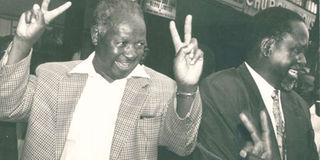Kenneth Matiba, an intriguing story of wealth, politics, music

Mr Kenneth Matiba (left) with politician Raila Odinga during a past function. FILE PHOTO | NATION MEDIA GROUP
What you need to know:
- Matiba, a successful, largely conservative businessman, didn’t fit any established pattern. He was a strange political creature.
- Rich men like Matiba didn’t put their neck on the line forming parties and taking on the president in a virtual one-party State.
By the time I moved to Kenya a few years ago, outspoken Kenyan politician, democracy activist and businessman Kenneth Matiba, who died on Sunday, battling ill health, and swept along by the march of history, was no longer an active political figure.
Perhaps unknown to him, across the border — and probably further — he was an extremely fascinating figure.
The heyday of Matiba’s activism against Daniel arap Moi’s Kanu government in the late 1980s and through ’90s happened in a context when the model of ousting strongmen through multiparty politics was being challenged seriously in East Africa.
Tanzania was shifting to multiparty politics, not so much from outside but from inside, after Julius Nyerere and the ruling CCM walked the road to Damascus.
Among other things, the war against Ugandan military dictator Idi Amin led to the change.
LEADERSHIP CHANGE
Though the combined Tanzanian and Ugandan exile forces successfully deposed Amin in 1979, the cost of the war — coupled with its commitments to Southern African liberation movements — broke Tanzania’s economy.
Its victorious generals also accumulated wealth as war bounty in Uganda, placing them at odds with Nyerere’s Ujaama (socialism).
Tanzania tasted the forbidden fruit and lost its innocence.
In Ethiopia, change was knocking on the door and the vicious military junta of Mengistu Hailemariam was on the back foot as it lost ground to an armed rebellion led by Meles Zenawi’s Tigrayan Peoples’ Liberation Front (TPLF).
In Uganda, President Yoweri Museveni had made a heady rise to power with his National Resistance Army (NRA) rebels in 1986 as East Africa’s first rebellion to successfully take office.
LIBERATION
When Matiba ran his most successful presidential bid in 1992, placing second behind Moi, the Rwanda war was two years in.
So, while in West Africa the multiparty wave was on the rampage, outside of odd cases like Zambia, the whole Horn, East African and Southern Africa swathe was being “liberated”, or had been freed, by armed men and women.
There was, therefore, a lot of romanticism around “revolutionary” figures and, in Kenya itself, there was also the more militant option offered by politicians like Koigi wa Wamwere and the State-fanned hysteria about Mwakenya.
Matiba didn’t come from a historically political and ideological background like Jaramogi Oginga Odinga.
A successful, largely conservative businessman, he didn’t fit any established pattern. He was a strange political creature.
TRIBUTES
Rich men didn’t put their neck on the line forming parties and taking on the president in a virtual one-party State.
They passed money to the more professional opposition through a window in the dark of night, without anyone in power knowing about it.
And so, in Kampala, the regional centre of progressive thinking and gathering of that period, we listened as cleverer men debated how Matiba’s was “an unusual case of committing class suicide, because he was a capitalist”, and “not even middle class, but from the Kenyan bourgeoisie”.
In the eulogies that have followed his death, that bit of the Matiba — and Kenyan — story has not been well illuminated.
But we now know it was part of a wider trend in the continent that has seen rich men — who are not children of famous or wealthy fathers — take setbacks, and sometimes severe knocks, in the quest for the democracy and the presidency.
They come into politics after, not before, making their wealth.
MUSIC GROUP
In the case of Matiba, there was another seemingly non-political twist.
His daughter Susan Matiba, with Joy Mboya and Suzanne Gachukia, started up an all-female music group, Musikly Speaking.
Though all-female American music groups — The Supremes, Pointer Sisters, Sister Sledge, The Supremes — were quite the rage in our neck of the woods already, we didn’t have a local answer to them.
And Musikly Speaking was from both the bowels of the Kenyan middle and political class — a first.
UNIQUE
Was this a new cultural or political phenomenon, a correspondent for a major Dutch newspaper in Kampala who had a good nose for cultural trends and was a huge Musikly Speaking fan who reviewed everything they dropped liked to ask, setting off lively debate.
But, again, now we understand it as the junction at which the middle class and political children of the region finally began to explore an independent voice and path.
There was, probably, something special in Matiba’s household that also made that possible.
Mr Onyango-Obbo is the publisher of Africa data journalism site Africapedia.com and explainer Roguechiefs.com Twitter: @cobbo3





